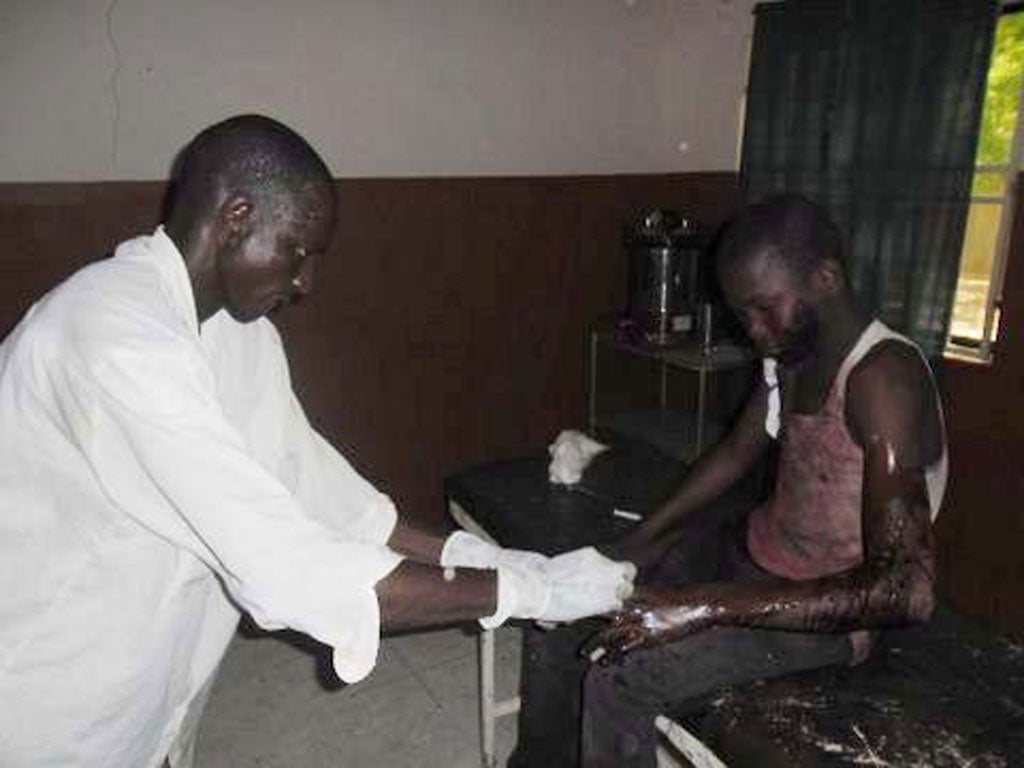Nigerian terror group attack kills 29 children
Boko Haram insurgents storm school in Yobe state armed with guns and cans of petrol

Your support helps us to tell the story
From reproductive rights to climate change to Big Tech, The Independent is on the ground when the story is developing. Whether it's investigating the financials of Elon Musk's pro-Trump PAC or producing our latest documentary, 'The A Word', which shines a light on the American women fighting for reproductive rights, we know how important it is to parse out the facts from the messaging.
At such a critical moment in US history, we need reporters on the ground. Your donation allows us to keep sending journalists to speak to both sides of the story.
The Independent is trusted by Americans across the entire political spectrum. And unlike many other quality news outlets, we choose not to lock Americans out of our reporting and analysis with paywalls. We believe quality journalism should be available to everyone, paid for by those who can afford it.
Your support makes all the difference.Armed extremists stormed a school in north-east Nigeria in the early hours of yesterday morning, setting fire to the building and killing 29 students and a teacher.
Gunmen attacked Government Secondary School in the town of Mamudo in Yobe state at around 3am local time. Survivors said suspected militants arrived armed with guns and containers full of fuel and set fire to the school. Twenty-nine pupils out of a school population of 1,200 died, together with an English teacher, named as Mohammed Musa, who was shot in the chest, according to an agency report. Survivors were treated for burns in a nearby hospital.
In a separate attack in Taraba state, suspected Islamist gunmen robbed a bank, killing three policemen.
The school attack, believed to the work of the radical terror group Boko Haram, is the deadliest in a string of attacks on schools in the past few weeks by the Islamist organisation, which now controls territory in the far north-east of the country.
Nigeria's government is battling a growing insurgency from Boko Haram militants, responsible for around 2,000 deaths since the start of their violent campaign in 2009. The group's rise is seen as a threat to Nigeria's large oil industry.
In May, President Goodluck Jonathan declared a state of emergency in three north-eastern states, dispatching troops to try to crush the Islamist rebellion. Since the start of the government offensive, troops claim some success, regaining control of towns and villages in the north-east and arresting scores of extremist fighters.
The al-Qa'ida-allied group is calling for the implementation of sharia law across an ethnically diverse country where Christians, predominantly in the south, and Muslims, in the north, each make up around half of Nigeria's 175 million population.
Parents of the victims caught up in yestrday's attack wept as they tried to identify burnt bodies, some riddled with gunshot wounds. Malam Abdullahi, a farmer, found the bodies of his 10-year-old son, shot in the back as he apparently tried to run away, and his elder brother, 12, shot in the chest. "That's it, I'm taking my other boys out of school," he said, adding that he had three younger children in a nearby school.
"It's not safe," he added. "The gunmen are attacking schools and there is no protection for students, despite all the soldiers."
One eyewitness described the moment of panic when he woke to find an attacker confronting him. "We were sleeping when we heard gunshots. When I woke up, someone was pointing a gun at me," said 15-year-old Musa Hassan, who had four fingers blown off from his right hand. "They burned the children alive," he added, describing how the gunmen brought jerry cans of fuel to torch the complex.
Dozens of children were reported as having escaped by running into the nearby bush, though they have not been seen since.
Since the start of its campaign four years ago, Boko Haram, whose name translates as "Western education is sinful", has blown up churches, traditional mosques, and the United Nations headquarters in Nigeria's capital, Abuja, in 2011.
Earlier this year, it carried out its first cross-border raid, kidnapping a group of French nationals as they returned from Waza National Park in Cameroon. The family of seven, including four children, were freed two months later.
To the north-west of Nigeria, Mali has lifted a six-month-long state of emergency to allow campaigning for the presidential election, due to be held at the end of the month. The move comes after a French-led offensive in January to drive Islamist militants from the country. Four former prime ministers, as well as 28 other candidates, are standing.
AP
Join our commenting forum
Join thought-provoking conversations, follow other Independent readers and see their replies
Comments